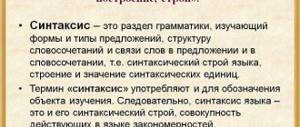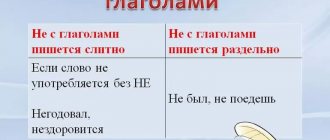so UNT / Lesson plans for the Russian language / Lesson plans for the Russian language 9th grade
Lesson 11 Topic: COMPLEX SENTENCE. THE CONCEPT OF A COMPLEX SENTENCE. BASIC TYPES OF COMPLEX SENTENCES
24.07.2013 53806 0
Goals:
teach to distinguish a simple sentence from a complex syntactic structure; deepen the concept of a complex sentence; improve the ability to identify methods and means of communication in complex sentences.
During the classes
I. Organizational moment.
II. Work at the board.
Exercise. Write down the sentences, determine which of them are simple and which are complex, and emphasize the grammatical basics.
The pine trees whisper welcomingly,
Birches rustle along the road.
And we are on fertile land
We live without need and anxiety.
Ya Kupala
III. Lesson topic message. Teacher's word.
A complex sentence is a syntactic construction that contains at least two grammatical bases (simple sentences) and represents a semantic and grammatical unity, formalized intonationally.
Simple sentences within a complex sentence can be connected using conjunctions (coordinating and subordinating), allied words (pronouns and pronominal adverbs) or in a non-union way, that is, only with the help of intonation. In this regard, complex sentences are divided into two groups: allied (compound and complex) and non-union.
Complex sentences, like all sentences, serve for communication between people, express a message, a question or an incentive to action and have the obligatory features of a sentence - the presence of a grammatical basis and ending intonation. This makes complex sentences closer to simple ones, for example:
1. The sky became completely covered with clouds again, and it began to rain.
(M. Gorky.)
2. The mountain ash turned red, the water turned blue. (S. Yesenin.)
3. He [Pushkin] is for Russian art what Lomonosov is for Russian enlightenment in general.
4. The dusk became thicker, and the stars shone higher. (I. Bunin.)
5. We drove out into barely green fields, over which a lark sang hotly in the sunlight, fluttering its wings. (A. Tolstoy.)
Class assignment. Write down the sentences and answer the following questions orally:
– What sentences are called complex?
– What groups are complex sentences divided into?
– What groups are complex conjunction sentences divided into?
– What means of communication are typical for types of complex sentences?
– What means of communication is common to all species?
IV. Independent work with the textbook.
Exercise. Read the material § 7, 8, 9, 10 and answer the questions:
– What in the material in the paragraphs was completely new to you?
– What seemed difficult?
V. Lesson summary.
Homework.
§ 7–10, ex. 46, 47.
The role of demonstrative words in SPP presentation for a lesson in the Russian language (grade 9) on the topic
Slide 1
The role of demonstrative words in complex sentences.
Slide 2
Repetition The cloud turned into a white cloud, which rose heavily and grew. By what signs can one determine that this is an SPP? What are the means of communication between the main clause and the subordinate clause?
Slide 3
A friendship that cannot withstand the naked truth should not be regretted.
Slide 4
The syntactic role of demonstrative words corresponds to the type of subordinate clauses and emphasizes their main meaning.
Slide 5
We walked until the reflections of the stars began to fade in the windows of the dachas.
Slide 6
I was so tired that I couldn’t go any further. Let's move the demonstrative word from the main clause to the subordinate clause. I was tired, so (union) I couldn’t go any further. What happened to the union? Has the meaning of subordinate clauses changed?
Slide 7
The placement of a comma can affect the meaning of a subordinate clause. I was so tired (how?) that I could not go further. (clause of manner of action) I was tired, (What follows from this?) so I could not go further. (subordinate clause)
Slide 8
Compound conjunction Demonstrative word + conjunction Because that Because that Because Because In order to In order to Since since Since since
Slide 9
At first, to achieve, by heart, to interest, that, this, such, so much, there, here, there, then, therefore, so, with a ball, competitions, champion, no one, not, because, in order to
Slide 10
Demonstrative pronouns: That, such, this, all, everything, everyone, everyone, no one, nothing, someone, something, etc. Adverbs: From there, then, so, everywhere, everywhere, etc.
Slide 11
In a complex sentence, demonstrative pronouns serve to connect the subordinate clause with the main one. They are members of the main clause. The syntactic role of demonstrative words corresponds to the type of subordinate clauses and emphasizes their main meaning.
Slide 12
The tree is felled where it bent [op. word],(). As is the summer, so is the hay. ( ), [ op. word ] Astronomy fascinated me because I considered and still consider not only the Earth, but partly the Universe as the property of human posterity. [index word] ,( ).
Slide 13
I looked out the window and closed my eyes at the clear and bright blue sky in which one transparent star, thinner from the dawn, still floated. We were convinced that juniper grows throughout the gorge here from the first minutes of our stay in the mountains. Many flower lovers have probably noticed that some flowers cannot be combined in one vase.
Slide 14
It was visible how the eagle hovered motionless and glidingly turned its head back and forth to get a better look at us. On the day the story is about, the guys came to the gym early. They made a bed for the guest in the living room on the sofa and lit a lamp so that it would not be dark for him.
Slide 15
It was easy to lose each other since a lot of people gathered in this square. The old man spoke with enthusiasm, as if he was pouring out his soul to the visitor. To get the ball into the basket without missing, you first need to practice the movements of your hand and shoulder.




